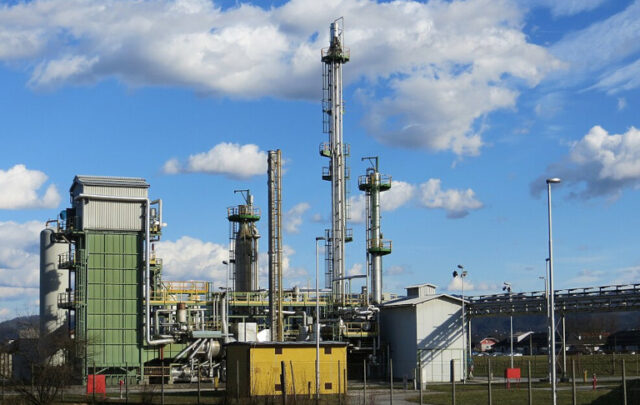Sky-high oil prices are already taking their toll, eating into consumers’ spending power and squeezing corporate margins; but the short-term economic pain is also a harsh reminder to the world’s richest countries that they have never been able to kick their addiction to the sticky black stuff – and time is running out.
The world has about a trillion barrels of proven oil reserves left, according to the producers’ cartel, Opec. At the current rate of global consumption, that should last us about 40 years: too long to bother the traders whose frenzied buying pushed up the price of crude to record levels last week; but not long enough to ignore. Natural gas will last a bit longer – perhaps 60 years at the current rate – but is still finite.
‘We have a responsibility to our great grandchildren to do something now, in 2004,’ says Andrew Oswald, professor of economics at Warwick University. ‘The whole history of economics is of consumers being woefully short-sighted.’
The developed world’s dependence on crude is laid bare when the price surges, as it has over recent months, gaining more than 40 per cent since January. As the cost of a barrel of oil nudged $50 at the end of last week, boosted by renewed violence in Iraq and uncertainty about the future for Russian giant Yukos, economists were already fretting that the global economic recovery could be engulfed in an oil slick.
‘Higher oil prices act very much like a tax, reducing consumers’ purchasing power for other goods and services,’ explains Paul Ashworth, of Capital Economics, who calculates that every $10 per barrel increase in the oil price increases US consumers’ spending on oil and petrol by about $50bn a year. And when households feel poorer and spend less – and businesses too have to meet higher energy bills – economic growth suffers. According to the International Energy Agency, a sustained $10 per barrel rise in the price of crude cuts the output of the rich OECD countries by an average of 0.4 per cent and leads to 400,000 job losses. The International Monetary Fund is expecting global growth to pick up to 4 per cent this year, but economists are nervous that the US, and the eurozone in particular, could be vulnerable.
‘Almost everything that moves in modern society moves because of oil: it remains the most influential substance in daily life,’ Oswald says. When the geologist M King Hubbert warned in the 1950s that oil extraction would inevitably turn downwards, he was widely derided, but US extraction hit its peak at the end of the 1960s, and is well on its way down the ‘Hubbert curve’. As their own reserves run down, the world’s biggest economies become increasingly dependent on some of the most politically unstable regions – crucially, the Middle East – for the juice to run their cars and factories.
Many countries now use less crude to produce each unit of output than they did at the time of the 1973 oil shock, when Opec grabbed the oil-thirsty western economies by the throat and prices quadrupled. But fresh industrialisation in rapidly expanding countries such as India and China and the explosion in the use of cars means total global demand is expanding at its fastest pace for 25 years.
The current price crunch could provide a taste of things to come: analysts think prices will stay above $40 at least until the end of the year, and Paul Horsnell, head of energy research at Barclays Capital, is pencilling in an average price of $38 in 2005 – well above levels seen over recent years. ‘It’s a recognition that long-term prices close to $20 a barrel are too low to guarantee sufficient investment into the energy industries,’ he says. Prices of around $20 a barrel in the 1990s didn’t encourage the oil companies to spend on infrastructure, and the International Energy Agency has calculated that just to upgrade the network and keep supplies flowing will demand $16 trillion of investment between now and 2025.
Heavy investment in infrastructure can help to squeeze the last drops out of the world’s oilfields, but it can’t overcome the underlying problem worrying far-sighted economists: fossil fuel resources are finite. In theory, as oil becomes more scarce, and prices begin to rise, entrepreneurial investors should have plenty of incentive to chuck their cash into alternative forms of energy – but in practice powerful existing interests tend to create inertia.
Britain’s businesses are already calling on the government to try and cushion the blow of rising oil prices. The fuel protests of autumn 2000 showed that one of the few things that can spur the British people into acts of mass civil disobedience is the price of a gallon of petrol. Imposing extra tax now, to pay for investment in new technology and prevent our great grandchildren from facing a crisis, could be a career-wrecking move. One of US President George Bush’s campaign adverts shows 12 men riding a rickety overstretched bicycle, with a voice-over saying: ‘Some people have wacky ideas. Like taxing gasoline more so people drive less. That’s John Kerry.’
Despite his insistence that concerted government action is needed now to prepare for an oil-free future, Oswald thinks the current crunch will not cause enough economic pain to force a serious change of approach.
‘We need global coordination to face up to this,’ he says. And there is only one way to force consumers and firms to envisage alternatives: ‘The price has got to be much higher.’ To make that happen, he believes: ‘I think it will take some sort of crisis, maybe military, maybe climate-related.’
Environmentalists, who attack fossil fuel use because of its impact on global warming, agree. They argue for the ‘polluter pays’ principle, on which the user of fuel has to meet the wider costs to the environment, in global warming and so on – what economists call the ‘externalities’.
‘The impact of climate change is going to be economically significant, but at the moment that doesn’t feed through to energy prices,’ says Mike Childs, campaign director at Friends of the Earth, who would like to see a tax on carbon use.
The government has acted to set targets for the proportion of energy that must come from renewable sources such as wind and solar power, in line with its promises under the Kyoto Climate Change Treaty – 10 per cent by 2010, and 15 per cent by 2015.
It is also deciding how to implement European directives on cutting sulphur emissions from Britain’s creaking coal-fired power stations. But with all Britain’s nuclear power stations in the costly process of being decommissioned, and doubts about the capacity of wind power to take the place of coal and gas, no one has suggesteda viable plan to cope with the longer-term running down of oil resources.
Meanwhile, like all addicts, oil analysts focus on the short term: avidly reading this week’s production figures and following the impact on prices of elections, corporate upheavals and wars. And, just as they were during the larger shocks of the 1970s, consumers and companies are similarly focused on the present. They will watch their petrol tanks and fuel bills mount until the oil infrastructure catches up with demand and prices fall back a bit. Then they will carry on much as before.
The chances of the world’s wealthy nations weaning themselves off oil is still, as both the environmentalists and the economists agree, a pipe dream.





